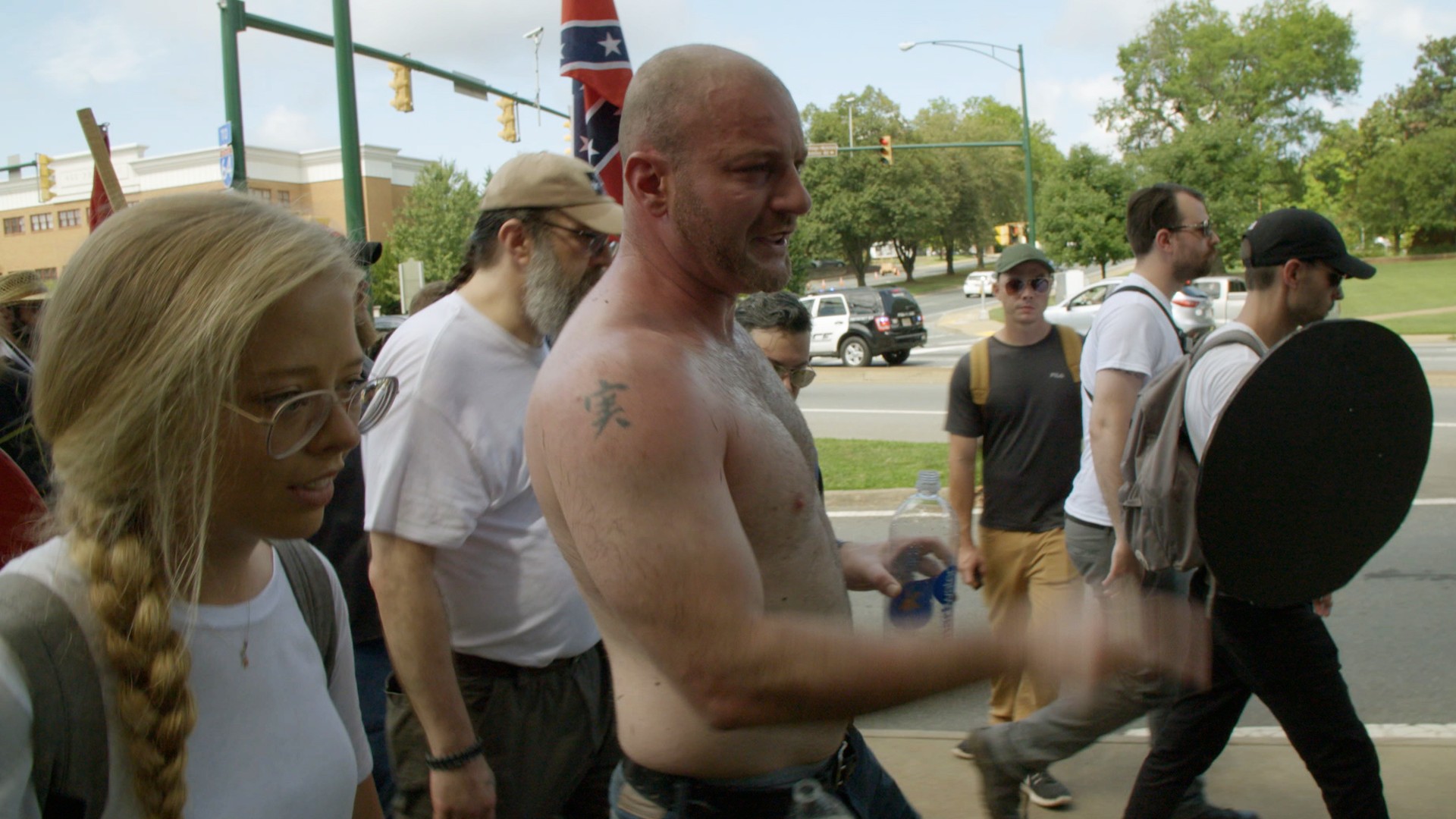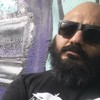On the morning of January 26, almost exactly 72 years after allied forces liberated the notorious Nazi death camp at Auschwitz, Michael Dewitz climbed off his bicycle near Turlington Plaza, a popular gathering place for students on the University of Florida campus in Gainesville. Dressed in all black and sporting a Nazi armband, the 34-year-old stood up on a bench and said little as an angry crowd mushroomed around him.Within a few hours, the number of protesters denouncing Dewitz grew from a few dozen to more than 200 people, some holding freshly printed signs depicting crossed-out swastikas. Others were content just to flip him off. But Dewitz remained quiet—even when some students got within inches of his face. Around 2 PM, after being escorted from the scene by campus police officers, he was reportedly jumped and his black jacket—the one replete with a Third Reich logo—stolen. Two men were subsequently arrested and charged with robbery in connection with the incident, their alleged targeting of Dewitz a testament to the intensity of the local reaction to his toxic message."Seeing the Nazi symbol on his arm was scarier than anything he could have said," Danny Hernandez, a 20-year-old University of Florida junior, told me. "He was there in a peaceful way, but you could tell his intentions were not peaceful."Dewitz's stunt served as a prelude to the potential chaos looming when Richard Spencer, perhaps the most influential figurehead atop America's surging white nationalist movement, speaks at the university's 1,700-seat Curtis M. Phillip Center for the Performing Arts on Thursday. It's set to be Spencer's first major campus speech since leading hundreds of white supremacists holding flaming tiki torches and chanting "Jews will not replace us!" through the University of Virginia in August. When police tried to shut down a related protest the next day, 32-year-old counter-protester Heather Heyer was killed after a car allegedly aimed deliberately by a white nationalist plowed into the crowd. Dozens more were injured, including a 20-year-old black man named DeAndre Harris. (Bizarrely, Harris has been arrested on felony assault charges after being accused of injuring one of his alleged white supremacist assailants.)Spencer was scheduled to make an appearance at Texas A&M University last month, but school officials cancelled it because of a policy barring outside groups or individuals from appearing without sponsorship from a college organization. Earlier this month, Spencer and a smaller group of white nationalists returned to Charlottesville, where they held another, violence-free tiki torch rally, albeit not in an official campus venue.

In hopes of avoiding disaster, U-F is prepared to spend about half a million dollars on a beefed-up police presence involving campus police, the Gainesville Police Department, and other outside law enforcement agencies. To that end, Governor Rick Scott on Monday declared a state of emergency in Alachua County, where the college is based, citing the violence in Charlottesville as precedent. Meanwhile, University of Florida students are on edge at a time when the racism simmering around the Trump White House and its allies at far-right outlets like Breitbart can make even liberal college campuses seem vulnerable to extremist violence."There is still going to be conflict, especially since Spencer attracts a lot of white supremacists and there are so many minorities on campus who feel afraid because of the ideas he spreads," Hernandez said. "I wish he wasn't coming and that they would have canceled the event."A Cuban American from Hialeah, a city in Miami-Dade County, Hernandez plans to avoid the campus on Thursday out of concern for his personal safety. "I don't have any classes that day," he told me. "But I am scared. I am hoping he just passes through quickly and nothing comes of it."Dwayne Fletcher, the 21-year-old president of the university's black student union, said the risk to his physical well-being is not worth protesting Spencer. "I did a cost-benefit analysis," he told me. "Ultimately, it won't lead to anything fruitful or meaningful change."Fletcher expects the same crowd of neo-Nazis and other white supremacists who tore up Charlottesville to descend on his college town, traditionally known as a bastion of SEC football and punk music. "They are definitely capable of doing harm to others," Fletcher said. "I could go and come out unscathed, but I don't want to take a chance."Spencer's scheduled visit comes as the Sunshine State has emerged as a hotbed for alt-right activism and white supremacist activities. In May, after resigning from Breitbart and losing his book deal, far-right provocateur Milo Yiannopoulos retreated to Miami, where he launched a new business venture with a party featuring guests flashing the "OK" sign that has become an alt-right symbol. The same month, Florida members of the alt-right group "Proud Boys" held a protest in downtown Sarasota against the city becoming a sanctuary city for undocumented people.Also in May, Brandon Russell—a national guardsman and self-described neo-Nazi based in Tampa—was arrested on explosives charges. Prosecutors alleged Russell planned to blow up power lines in the Everglades and possibly launch explosives into the Turkey Point nuclear power plant, based on a confession made by his roommate Devon Arthurs. Arthurs is facing state murder charges after allegedly killing two other friends who lived in the same apartment, and Russell has since pleaded guilty to multiple felonies related to the explosives.In early August, members of the Sons of Confederate Veterans stood guard over a Confederate monument in front of the historic county courthouse in downtown Tampa shortly after another rebel statue came down in North Carolina. A few weeks later, local police in Hollywood, Florida, arrested 22-year-old Christopher Rey Monzon after he reportedly tried to jump a security barricade and charge protesters with his Confederate flag. Monzon was said to be protesting an ultimately approved plan from the Hollywood City Commission to change the names of three streets named after Confederate military leaders.University of Florida president W. Kent Fuchs moved to squash Spencer's appearance when it was first planned for September. "The likelihood of violence and potential injury—not the words or ideas—has caused us to take this action," he wrote in a statement at the time.But Spencer's National Policy Institute threatened a lawsuit, claiming his speech is protected by the First Amendment. The institute won a similar dispute against Auburn University, and free speech scholars opined Fuchs might be on shaky legal ground. In a video statement issued last week, Fuchs said the university is required by law to allow Spencer to speak, acknowledging that the Institute cannot be billed the full cost of security measures. Fuchs also advised students, faculty, and other university employees to ignore Spencer and his followers."Although I urge you to avoid the Spencer event, I ask that you not let Mr. Spencer's message of hate and racism to go unchallenged," Fuchs said. "Make it clear that messages of hate on campus are contrary to our values."Cameron Padgett, a 29-year-old graduate student at Georgia Southern University who helped book the Phillips Center for Spencer's speech, said friends who attend the University of Florida asked him to set up the event. "When they actually listened to some of his videos and heard him actually speak, they realized the headlines about him didn't match up with his ideas," Padgett claimed in an interview.I asked Padgett if he could put me in touch with University of Florida students who want to hear Spencer speak, but he said he was not able to convince anyone to go on record.In a separate interview, Spencer said neither he nor his organization are going to hold a rally or march before or after his Phillips Center speech. "I would say there are tons of students and members of the Gainesville community who are interested in what I have to say," he told me. "And they are not going to engage in violence."As he has in the past, Spencer blamed Antifa and left-wing activists, as well as Charlottesville public officials, for what went down at the University of Virginia campus—despite reports that Antifa helped protect counter-demonstrators from attack and perhaps even saved lives. But Spencer praised University of Florida administrators and local police officials. "They seem like quite sensible and serious people," he said. "In all likelihood they are doing best job they can. The reason Charlottesville got violent is because the mayor and the police department didn't do their jobs."Charlottesville mayor Michael Signer, a Democrat, laid the blame on the doorstep of the White House, noting President Trump has emboldened white, right-wing extremists who sometimes engage in violence.University spokeswoman Janine Sikes, along with a spokesman for the Gainesville Police Department, declined to provide specific details about the college's security plan for fear of compromising it. "The collaboration of law enforcement agencies is quite similar to a major football event, though on a larger scale," she told me. "Keeping our campus safe is paramount."The school has announced that roads surrounding the Phillips Center will be closed for traffic and that the garage and surface lots in front of the building will be inaccessible. In addition, the college has issued a list of banned items for anyone attending Spencer's speech or the planned protests. Among the things people can't bring are backpacks, purses, bottled water, coolers, drones, masks of any kind, tobacco products, lighters, flag poles, megaphones, athletic equipment that can be used as weapons. Because Florida does not allow open-carry of guns and state law bans firearms on campus, it is unlikely heavily armed militiamen will dominate the scene as they did in Charlottesville.For his part, Charles Walkwood, a white, 20-year-old environmental science major at UF, actually shared Spencer's appraisal of the campus's prep effort—even though he planned to be part of the protests against the white nationalist. According to a Facebook page called No Nazis at UF, more than 2,700 people plan to show up at the Phillips Center to express their disapproval."Of course, I am concerned about safety after what happened in Charlottesville," Walkwood said. "But I am not necessarily sure it is going to get as violent as it did there. The school is really locking things down."Follow Francisco Alvarado on Twitter.
Advertisement
Advertisement

In hopes of avoiding disaster, U-F is prepared to spend about half a million dollars on a beefed-up police presence involving campus police, the Gainesville Police Department, and other outside law enforcement agencies. To that end, Governor Rick Scott on Monday declared a state of emergency in Alachua County, where the college is based, citing the violence in Charlottesville as precedent. Meanwhile, University of Florida students are on edge at a time when the racism simmering around the Trump White House and its allies at far-right outlets like Breitbart can make even liberal college campuses seem vulnerable to extremist violence."There is still going to be conflict, especially since Spencer attracts a lot of white supremacists and there are so many minorities on campus who feel afraid because of the ideas he spreads," Hernandez said. "I wish he wasn't coming and that they would have canceled the event."A Cuban American from Hialeah, a city in Miami-Dade County, Hernandez plans to avoid the campus on Thursday out of concern for his personal safety. "I don't have any classes that day," he told me. "But I am scared. I am hoping he just passes through quickly and nothing comes of it."
Advertisement
Advertisement
Advertisement
Advertisement
